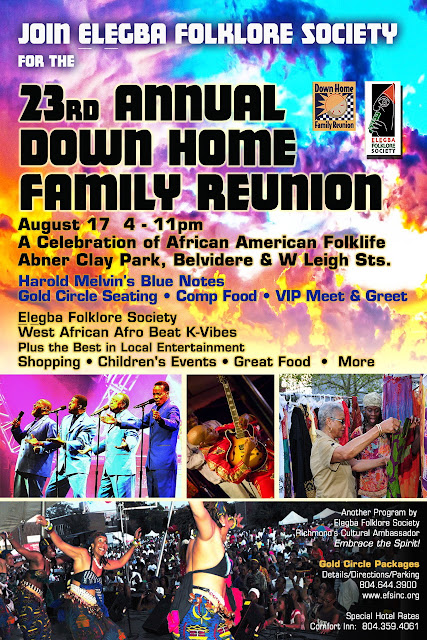Capital City Kwanzaa Festival

Aziza Beauty Supply will be a part of the Capital City Kwanzaa Festival that will take place December 27, 2008 at The Showplace Exhibition Center (3000 Mechanicsville Turnpike, Richmond, VA 23223). The event is from 1pm to 10pm and will feature Iyanla Vanzant, Plunky & Oneness, along with other entertainment. General Admission is $6, Students $5, Seniors 65+ $4, and children 12 and under are free. Come out and visit us, we will have some of our best selling products at the event.
Meaning of Kwanzaa
**Referenced from -- Maulana Karenga, Kwanzaa: A Celebration of Family, Community and Culture, 2008, Los Angeles: University of Sankore Press (www.sankorepress.com) & http://www.officialkwanzaawebsite.org
**Referenced from -- Maulana Karenga, Kwanzaa: A Celebration of Family, Community and Culture, 2008, Los Angeles: University of Sankore Press (www.sankorepress.com) & http://www.officialkwanzaawebsite.org
Kwanzaa is an African American and Pan-African holiday which celebrates family, community and culture. Celebrated from 26 December thru 1 January, its origins are in the first harvest celebrations of Africa from which it takes its name. The name Kwanzaa is derived from the phrase "matunda ya kwanza" which means "first fruits" in Swahili, a Pan-African language which is the most widely spoken African language.
The first-fruits celebrations are recorded in African history as far back as ancient Egypt and Nubia and appear in ancient and modern times in other classical African civilizations such as Ashantiland and Yorubaland. These celebrations are also found in ancient and modern times among societies as large as empires (the Zulu or kingdoms (Swaziland) or smaller societies and groups like the Matabele, Thonga and Lovedu, all of southeastern Africa. Kwanzaa builds on the five fundamental activities of Continental African "first fruit" celebrations: ingathering; reverence; commemoration; recommitment; and celebration. Kwanzaa, then, is:
- a time of ingathering of the people to reaffirm the bonds between them;
- a time of special reverence for the creator and creation in thanks and respect for the blessings, bountifulness and beauty of creation;
- a time for commemoration of the past in pursuit of its lessons and in honor of its models of human excellence, our ancestors;
- a time of recommitment to our highest cultural ideals in our ongoing effort to always bring forth the best of African cultural thought and practice; and
- a time for celebration of the Good, the good of life and of existence itself, the good of family, community and culture, the good of the awesome and the ordinary, in a word the good of the divine, natural and social.
Kwanzaa was created in 1966 by Dr. Maulana Karenga, professor of Africana Studies at California State University, Long Beach, author and scholar-activist who stresses the indispensable need to preserve, continually revitalize and promote African American culture.
Finally, it is important to note Kwanzaa is a cultural holiday, not a religious one, thus available to and practiced by Africans of all religious faiths who come together based on the rich, ancient and varied common ground of their Africanness.
Finally, it is important to note Kwanzaa is a cultural holiday, not a religious one, thus available to and practiced by Africans of all religious faiths who come together based on the rich, ancient and varied common ground of their Africanness.
Kwanzaa was created to introduce and reinforce seven basic values of African culture which contribute to building and reinforcing family, community and culture among African American people as well as Africans throughout the world African community. These values are called the Nguzo Saba which in Swahili means the Seven Principles. Developed by Dr. Karenga, the Nguzo Saba stand at the heart of the origin and meaning of Kwanzaa, for it is these values which are not only the building blocks for community but also serve to reinforce and enhance them.
NGUZO SABA
 (The Seven Principles)
(The Seven Principles) Kujichagulia (Self-Determination)To define ourselves, name ourselves, create for ourselves and speak for ourselves.
 Ujima (Collective Work and Responsibility)To build and maintain our community together and make our brother's and sister's problems our problems and to solve them together.
Ujima (Collective Work and Responsibility)To build and maintain our community together and make our brother's and sister's problems our problems and to solve them together.
 Ujima (Collective Work and Responsibility)To build and maintain our community together and make our brother's and sister's problems our problems and to solve them together.
Ujima (Collective Work and Responsibility)To build and maintain our community together and make our brother's and sister's problems our problems and to solve them together.  Ujamaa (Cooperative Economics)To build and maintain our own stores, shops and other businesses and to profit from them together.
Ujamaa (Cooperative Economics)To build and maintain our own stores, shops and other businesses and to profit from them together.  Nia (Purpose)To make our collective vocation the building and developing of our community in order to restore our people to their traditional greatness.
Nia (Purpose)To make our collective vocation the building and developing of our community in order to restore our people to their traditional greatness.  Kuumba (Creativity)To do always as much as we can, in the way we can, in order to leave our community more beautiful and beneficial than we inherited it.
Kuumba (Creativity)To do always as much as we can, in the way we can, in order to leave our community more beautiful and beneficial than we inherited it.  Imani (Faith)To believe with all our heart in our people, our parents, our teachers, our leaders and the righteousness and victory of our struggle.
Imani (Faith)To believe with all our heart in our people, our parents, our teachers, our leaders and the righteousness and victory of our struggle.by Maulana Karenga




Comments